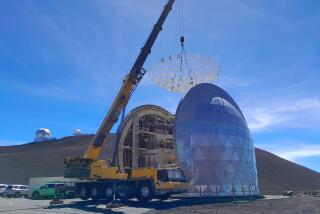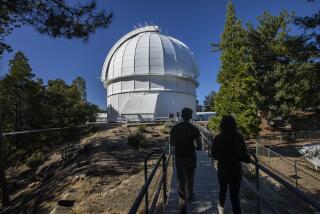Dispute Threatens Observatory Project in Chile : Astronomy: Legal wrangling imperils plan for the world’s most powerful telescope in the Atacama Desert.
- Share via
SANTIAGO, Chile — The clear, dry skies of the Atacama Desert in northern Chile make it a superb place to install the world’s most powerful telescope. A $500-million European project to do just that is threatened, however, by roiling clouds of legal uncertainty and political turbulence.
If the problems are not resolved soon, a spokesman for the project said, the telescope could go to another country, perhaps Namibia.
There was no trouble in sight when Chilean Gen. Augusto Pinochet signed a “supreme decree” in 1988 donating 280 square miles of desolate Atacama land for an observatory to be built by a scientific consortium of eight European governments. It was only after Pinochet’s military dictatorship ended in 1990 that the clouds rolled in.
Lawsuits over land titles have challenged Pinochet’s right to give away the land. An investigative committee of Chile’s Congress has added more legal questions and controversy.
Work is well under way on the observatory. The European countries have spent about $30 million building roads, leveling the top of an 8,600-foot mountain and laying massive foundations. In Europe, grinding and polishing has begun on four identical telescope mirrors that are eight meters, or 315 inches, in diameter.
The project’s scientific significance is far-reaching. The giant mirrors, to be linked electronically and used as a single telescope, together will have the light-gathering capacity of a single 16-meter mirror--more powerful than any other telescope on Earth. Astronomers hope that the unmatched combination of light-gathering power and the immaculate skies of the Atacama, one of the world’s driest deserts, will allow them to peer deeper into the cosmic distance than ever before.
The countries participating are Belgium, Denmark, France, Germany, Italy, the Netherlands, Sweden and Switzerland. They form the European Southern Observatory, or ESO, which already operates a major cluster of telescopes on a Chilean mountaintop called La Silla. La Silla is near La Serena, 300 highway miles north of Santiago, and is a close neighbor to two important American-run observatories, La Campana and Tololo.
Together, those observatories make Chile the leading astronomical center for viewing parts of the universe that are best seen from the Southern Hemisphere. But if the new ESO project were taken to another country, Chile’s preeminence could be overshadowed.
The mountain where construction has begun, known as Paranal, was part of neighboring Bolivia until Chile seized it in the 1879 War of the Pacific.
Heirs of Adm. Juan Latorre, a historic Chilean figure in that war, claim in their 1993 suit that their title to property on the slopes of Paranal dates back more than a century. Pinochet’s 1988 “supreme decree” donated the mountain and surrounding land to ESO as government land.
A 1977 law passed by the military government had declared two townships of former Bolivian territory as Chilean government lands. But Latorre’s heirs say the 1977 law failed to comply with a legal requirement that private property in the townships be excepted from government ownership. Two private companies claiming land in the area have filed similar suits.
In March a judge ordered work to stop on the disputed site. The observatory project was paralyzed for 27 days until a new court order allowed it to resume.
The final outcome of the suits remains in doubt. Such legal disputes in Chile have been known to drag on for years. The first telescope unit at Paranal is scheduled to be in operation by 1997, and the full battery of four mirrors is to be working in 2001.
The Foreign Ministry and ESO are hoping that the claims can be settled out of court, but agreement may be difficult. ESO has said the Chilean government is liable for any cost, but Latorre’s heirs have said it is ESO that should pay.
Meanwhile, the congressional committee investigating the observatory has raised further questions. There have even been allegations of fraud.
ESO has operated its observatory at La Silla since long before the military took power in 1973. A 1963 treaty granted the observatory exemption from Chilean taxes and from Chilean court jurisdiction. Such diplomatic immunity is routinely granted to official international organizations.
In a 1986 exchange of letters between ESO and the Chilean Foreign Ministry, it was agreed that, for legal purposes, the planned Paranal observatory would be part of ESO’s original observatory, and therefore would be covered by the 1963 treaty provisions.
Members of the congressional investigative committee now say that one of those diplomatic documents appears to have been falsified. The Foreign Ministry insists the document is valid.
Criticism has come not only from former opponents of the military government, including members of current President Eduardo Frei’s Christian Democratic Party, but also from members of the conservative opposition to Frei.
Members of the committee also contend ESO’s arrangement with the military regime would give the new observatory tax breaks worth $200 million. “I suspect corruption,” Congresswoman Evelyn Mattei told a Chilean newspaper.
ESO insists the Chilean government is responsible for handling all legal and political problems involving the donated land. “We received those lands from the government in good faith,” Daniel Hofstadt, a Frenchman who is ESO’s chief representative in Chile, said.
He emphasized that before the project can proceed much further, ESO needs “a clear guarantee” that all problems will be resolved. Without assurances “that we will have adequate conditions for proceeding,” he warned, the project could be moved.
“It is not what ESO wants,” but “if the impediments continue and we see that we cannot go on in an adequate way, we will have to look for an alternative,” Hofstadt said. ESO already is studying an alternative site in Namibia, which also has clear skies ideal for astronomy.
More to Read
Sign up for Essential California
The most important California stories and recommendations in your inbox every morning.
You may occasionally receive promotional content from the Los Angeles Times.












